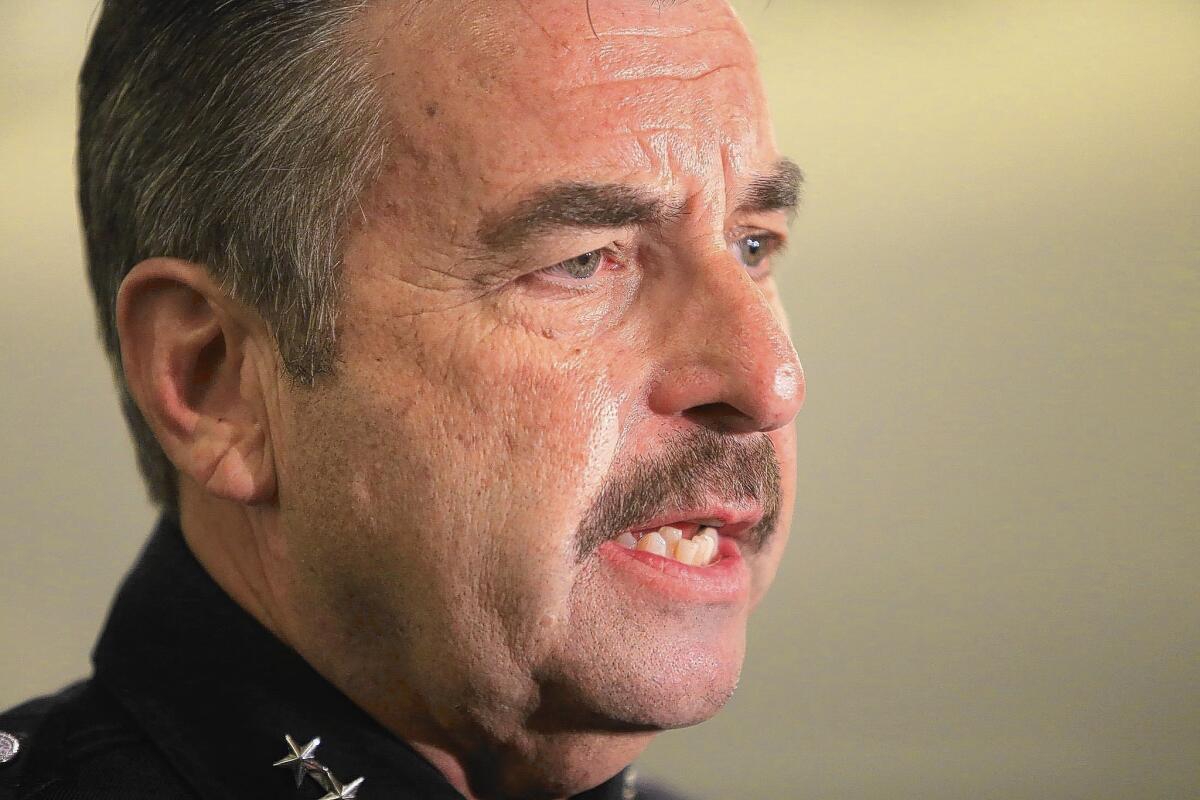Chief Beck’s decision sends wrong message

- Share via
Consider this hypothetical situation. You’re Joe Blow, an off-duty cop, and you’ve had too much to drink.
Things begin getting out of hand just short of 2 a.m., at a saloon. Some guy’s dancing with your wife and you don’t like it.
You give him a shove. A bouncer takes you outside. But you get into it with the guy you shoved as he’s leaving the bar.
You pull a .45 out of your pocket.
You begin to drive away, but you’re stopped by a sheriff’s deputy.
Then you use a slur to describe the black man with whom you scuffled, tell the deputy you’re drunk and refuse a sobriety test.
They let you go, and when internal affairs investigators look into the case you give them a different version of events.
You say you weren’t drunk, didn’t use a slur and didn’t drive your car after the confrontation.
But the evidence suggests you’re lying, including a taped recording of your conversation with the deputy who stopped you as you tried to leave.
So here’s the question:
Should you be allowed to keep your job as an officer of the law, or should you be fired?
The allegations above were presented to a Los Angeles Police Department disciplinary board in the case of 33-year-old police Officer Shaun Hillmann, who is accused of having said and done those things at the Maverick Saloon in Norco back in 2012. The board had no problem making a decision. As my colleague Joel Rubin reported, it unanimously recommended dismissal in January.
But LAPD Chief Charlie Beck came to the rescue of Hillmann, rejecting the board’s recommendation and instead giving Hillmann a 65-day suspension, according to sources.
One more thing:
Hillmann’s father was a longtime LAPD officer, and his uncle was a much-beloved former deputy chief who served along with Beck.
That had nothing to do with his decision, Beck told Rubin.
Nothing surprising about that claim, but I find it hard to believe. In the LAPD and every other law enforcement agency, the culture is a family culture, sometimes for the good and sometimes not.
“The actions are egregious,” Beck told Rubin. But what he and the disciplinary board differed on was the penalty, “and the penalty ultimately is the domain of the chief of police.”
The officer’s record was clean, according to sources, with numerous commendations. And Beck said the penalty he imposed “matches the nature and circumstances of the behavior.”
But “egregious” means shocking, outrageous, notorious. Is there any good reason to retain a cowboy cop whose actions you describe so critically?
Rubin reported that in more than four years as chief, Beck has handled 100 dismissal recommendations and agreed with disciplinary boards in every case except two. But that only raises more questions about why Hillmann got so lucky.
The disciplinary board dismissed several allegations against Hillmann but found that he provoked the confrontation in the bar, called his foe a monkey in a comment that was on tape, and told an investigator he did not drive after the confrontation despite a video showing that he had.
The board ruled that “if an officer’s integrity is damaged” it is not possible to “carry out the duties of a police officer.”
What does that mean?
A former high-ranking LAPD official suggested that once an officer’s integrity has been compromised, that could complicate the prosecution of future cases he’s involved in. And in some cases, prosecutors might have a duty to provide relevant information to the defense regarding witnesses they call.
“I have serious concerns about Hillmann’s retention,” said the former official, who spoke on condition of anonymity. The officer’s behavior at the saloon was bad enough, said the former official, but the finding that he gave false statements to investigators suggests an untruthfulness that renders Hillmann “basically useless to the LAPD.”
Police Commission Chairman Steve Soboroff has his own misgivings, telling The Times he wants a further explanation from Beck, who is away this week on a scheduled break. Soboroff said it was critical to make sure the disciplinary system doesn’t “favor or disfavor anyone.” He told me that he and Beck spoke briefly about the case Tuesday morning and will explore it in greater depth in the near future.
This little flare-up comes as Beck nears completion of his first five-year term in office, with his contract renewal coming up in November. By many measures, he’s been a solid, progressive chief with a focus on community policing, and Soboroff said he thought Beck and the department were first-rate. But this is the second time this year Soboroff has clashed with Beck over the chief’s handling of a disciplinary case.
In February, Beck ruled that eight officers would be returned to field duty despite having violated policy during the hunt for Christopher Dorner, the rogue former officer, mistakenly firing more than 100 rounds at two newspaper delivery women whom they took to be the suspect.
Being a cop is a tough job, and so is being a chief, Soboroff said. But the commission’s duty is to “get as much information as we can” in reviewing Beck’s handling of discipline cases.
Soboroff told me he’d tell his own sons that “if you get caught drunk driving, and you get caught lying, and you make racial slurs, I hope you’re fired.”
If I had to guess, I’d say Beck has enough support to keep his job, if he wants another five years. But his handling of this case sends the wrong message to cops and to a city that needs to know the LAPD will root out the rogues, serve and protect with integrity and do everything it can to earn the community’s trust.
Sorry, Charlie.
You got this one wrong.
More to Read
Sign up for Essential California
The most important California stories and recommendations in your inbox every morning.
You may occasionally receive promotional content from the Los Angeles Times.










